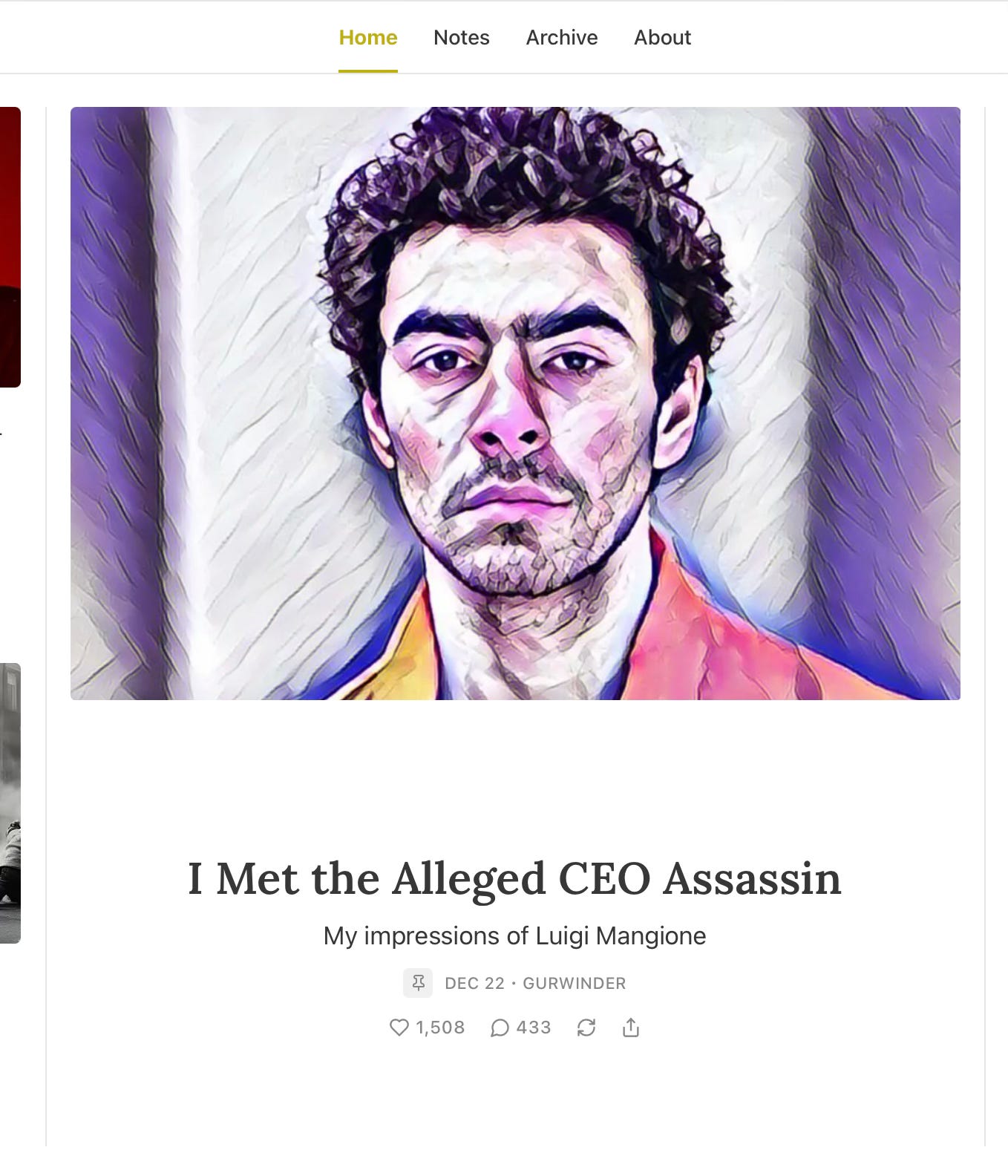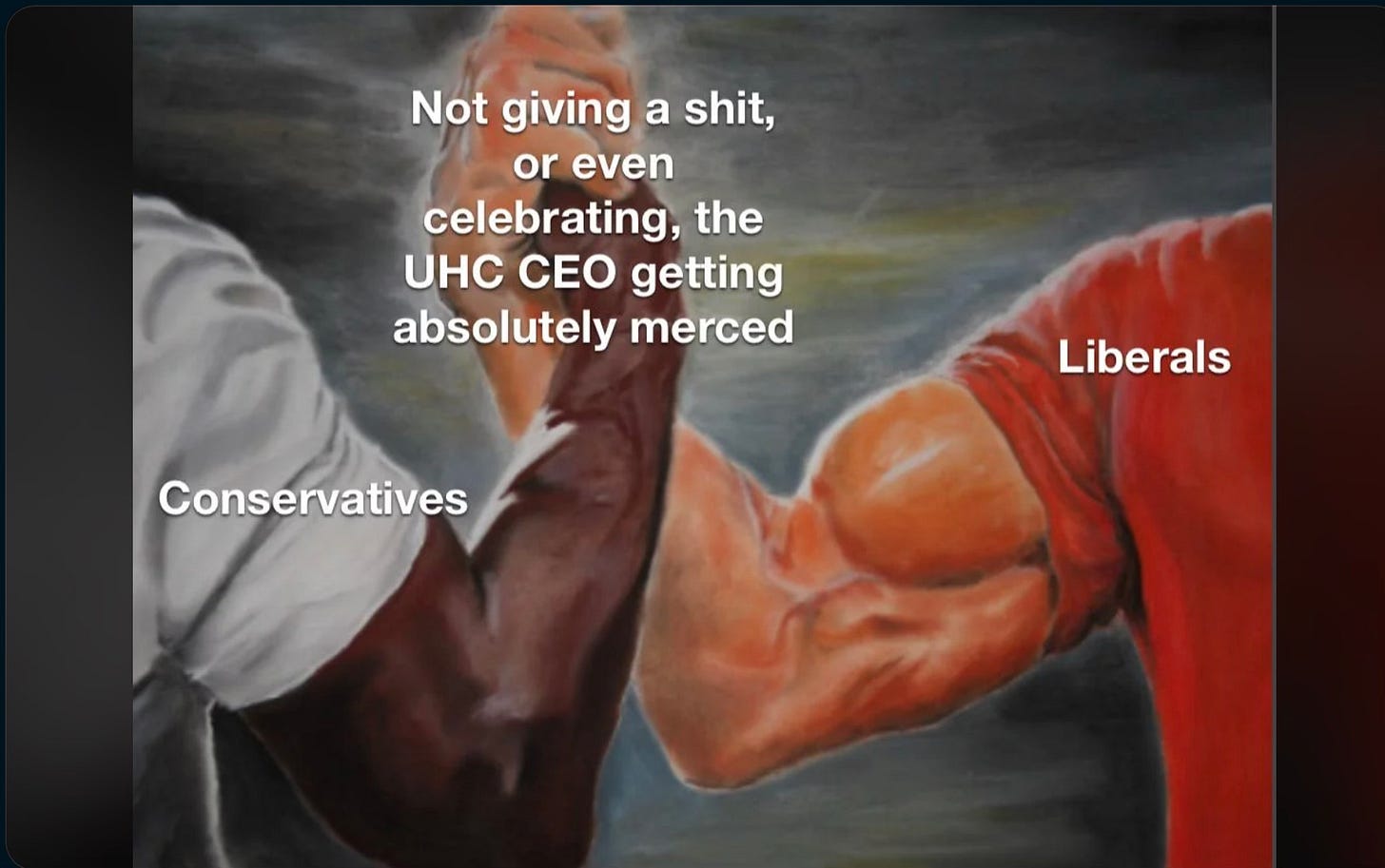In Response: Gurwinder's "The Riddle of Luigi Mangione"
Why firsthand experience with the American healthcare industry is the only way to understand the durability of the public's empathy for Luigi Mangione
Tonight I felt compelled to respond to Gurwinder’s piece on Luigi Mangione because many of the statements in this piece seem to reflect a general lack of acquaintance with the American healthcare industry. (I’m not being judgmental, because it is byzantine and difficult even for Americans to understand, even though it is part of our daily lives.) But I ended up writing something too long to be posted as a comment on his piece, so I’m posting it here.
If you haven’t read his piece yet, you should before reading mine.
"A tiny cog in a vast and unfair system that’s controlled by no single person but by the cumulative actions of millions of people operating in their own immediate interests” is a long sentence that obscures its initial claim that Brian Thompson was essentially a minor, and mindless, part of the machine.
This is simply not true, as it cannot be true of any chief executive of a company that is a massive and foundational part of the “unfair system” referenced here, particularly one that is an oligopoly. Writing him off this way reads as a preemptive dismissal of many Americans’ concerns with the policies he implemented at UHC which directly and negatively impacted their lives.
Thompson was the leader of the largest, most profitable health insurer in America, profitable, partly, because of his team’s claim denial mechanism, which churned out denials at a rate more than three times higher than its closest competitor. Thompson directly oversaw this shift, which was caused, in part, by his team’s implementation of an AI-assisted claims denial process that had a known 90% error rate. (Here is a second source, for anyone interested.)
If you aren’t a policyholder in the United States, you may not know that claims denial is often a game of chicken—these companies depend on a percentage of us giving up on challenging an unjustly denied claim, because it requires multiple phone calls, paperwork, often coordinating responses with our providers, and many times having to do this over and over again with different customer service agents, often in the midst of a recent devastating diagnosis, with a ticking clock to boot.
It’s no surprise that the very sick don’t have the strength to run this gauntlet. It is a truly soul-sucking experience, which is why so many Americans reacted to Luigi Mangione’s alleged actions viscerally.
The American Hospital Association had publicly criticized this “cog” for his plans to deny insurance payments for what UHC deemed “non-critical” visits to the ER. Seeing as UHC was already being sued for its claim-denial algorithm, one could be forgiven for not feeling that UHC was in a position to decide what a non-critical medical event is.
These were not decisions or initiatives designed by “actuaries.” These were intentional corporate decisions not output from mindless “cogs.”
Second, using perceived slim profit margins to wave away the enormous profits made by companies like UHC ($22.3 billion in profit in 2023) or to minimize them is misleading, as is the straight comparison of health care companies with other “S&P 500” corporations. Most of the S&P companies are in highly competitive markets with narrow margins because of high competition or operational costs (e.g., retail, airlines, energy). Health insurance, in this country, is an oligopoly. Health insurance companies face less competition and can maintain immense profitability even with lower margins. An economist can compare Exxon, which deals in oil and gas, with UHC, which deals in human lives and suffering, but someone wishing to have an intellectually honest conversation about this moment can't.
Writing that “the CEO doesn’t set the approval rate of a health insurance company’s payouts — that’s done by the actuaries” is a strange, almost naïve comment. While actuaries play a technical role in calculating risks and costs, their work is conducted within the framework of priorities set by executive leadership, including the CEO.
Brian Thompson’s very job description included setting company-wide objectives, including profit targets and cost-management strategies. It should be obvious that these priorities inevitably influence how aggressively claims are denied or approved.
Further, high denial rates are not merely the result of actuarial calculations but come from policy decisions about what UHC thinks is “medically necessary.” These policies are of course crafted under executive oversight to align with financial goals. In other words, actuaries model outcomes, but leaders make the decisions.
And as CEO compensation is tied directly to financial performance metrics, such as profit margins and stock prices, a focus on reducing medical claim payouts aligns with these incentives. This makes any claim that CEOs are not involved or influential on claims denial rates pretty implausible.
Then Gurwinder states that “health insurance companies don’t get rich by denying payouts for claims.” Again—what? Denying claims reduces payouts and contributes to the bottom line, which benefits shareholders and executives far more than individual policyholders, who are paying higher and higher premiums and deductibles every year, something anyone who currently has health insurance in this country can attest to personally.
Overall, it just feels like this argument that minimizes Brian Thompson’s leadership and agency, and minimizes the rapacity with which the health insurance industry conducts business, reflects a lack of understanding of American corporate governance. (Incidentally, I find this a little ironic because in this piece Gurwinder criticizes those who “deny all agency to Luigi” by attributing his alleged actions to a “corrupt system or simple back pain”).
This argument also ignores basic things like executive compensation and stock buybacks, which funnel significant resources to shareholders and CEOs rather than patient care. It ignores the fact that companies like UHC maximize profits by narrowing provider networks (the dreaded “out-of-network” problem that bankrupts people), having high deductibles, and insisting on prior authorizations for routine procedures, which directly impact patient access to care and which often waste crucial time, especially for people with life-threatening illnesses.
This latter is also a moneymaker because of the attrition effect—people too broken and too beaten down to continue with the Kafka-esque process of prior authorization.
These kinds of decisions are not made by “actuaries” and they aren’t made to “keep costs down” for policyholders. They are made by corporate leaders, like Brian Thompson, to maximize profits, and they have profound and sometimes deadly serious impacts on thousands of Americans.
These are impacts that the industry, the wealthy and powerful, and the mainstream media have ignored, if their responses to public indifference to the murder of a healthcare executive is any measure.
But if any of them truly absorbed the horrific fact that 500,000 Americans every year1 declare medical bankruptcy, you might not be so surprised by the reaction. That’s half a million people every single year whose lives have been destroyed because of a medical event—a car crash, a heart attack, a stroke, a cancer diagnosis. Has Gurwinder, or any talking head in the mainstream media, ever imagined being in their shoes?
You’ve worked your entire life to build something. You’ve probably saved a little. You’ve been able to feed your family, buy them clothing, maybe pay for their piano lessons or soccer seasons. Every few years, maybe you can afford to take a vacation to Myrtle Beach. You work hard and you have health insurance, for which you pay a premium every month and a four thousand dollar deductible before any of your benefits kick in. You managed to meet that deductible somehow, through a combination of the fees you had to pay completely out of pocket for your kids’ visits to the pediatrician, your wife’s PT for her slipped disc, for that pre-cancerous mole you had removed from your back, and that ER visit when your toddler swallowed a watch battery. So now you only have to pay 20% of every medical expense instead of all of it. In other words, you’ve done all the right things.
Then you’re in a car accident. An idiot runs a red and into your car. The hospital the ambulance takes you to is out-of-network. You’d have tried to get prior authorization figured out before getting there but you were strapped to a gurney with two broken legs, a collapsed lung, and internal bleeding, so were in no position to do so before arriving at the out-of-network hospital.
After two weeks, you aren’t really well enough to go home, but you got nervous when someone from the billing department cornered your wife and asked her who was going to be paying the bill. What bill? That’s when you learn for the first time that the insurance you’ve been paying for isn’t going to cover your hospital stay because the hospital the ambulance took you to is not in network. Oh, and they won’t cover the ambulance charges either, because they didn’t think it was medically necessary.
And just like that you’ve wracked up $175,000 in charges. Six months later, you’re bankrupt.
Variations on this theme unfold across the United States at least 500,000 times every year. Homes gone. Savings gone. Dreams gone. And those are the people who survived. In this country, people die, often in pain and fear, because of insurance claims denials, delays, and lack of coverage. 500,000 people a year. Compound that over a handful of years, and now we’re talking about millions and millions of people whose lives have been ruined and dreams stolen by the health insurance industry.
And then the media and corporate mouthpieces have the audacity to scold these same people when they don’t weep for Brian Thompson, but instead try to shame them into mourning for a “cog” that helped a vicious machine to ruin their lives.
[update] A 2023 KFF survey found that six in ten adults with health insurance have dealt with unjustified claim denials, out-of-network issues, and preauthorization delays. This would be a massive scandal for any other industry in this country.
Six in ten. Are we still wondering why, in the days following December 4th, there was little sympathy for Brian Thompson? Endless stories poured forth on social media, from conservatives and progressives alike (not just “leftists”), about enduring pain, disfigurement, and even the death of loved ones because the insurance company to whom they’d faithfully paid premiums for years strung them along for weeks or months, making them jump through hoops, asking sick people to justify why they need medicine, trying to convince a company that calls a prosthetic arm for a child “unnecessary.”
Six in ten corresponds almost exactly the polling numbers recently released by NORC out of the University of Chicago, showing 67% of Americans “placed either a great deal or a moderate amount of blame on profits made by health insurance companies.” denials for health care coverage by insurance companies. 69% thought claim denials had “a great deal” or “moderate amount” of responsibility for the killing of Brian Thompson. This is not a fringe position, as many in the media tried to frame it.
For my part, I didn’t see “celebration” of Brian Thompson’s murder, except for the usual corners of the web where that sort of thing is common. What I did see was a collective shrug, an indifference, from all points along the sociopolitical spectrum. I found it fascinating. I’d never seen anything like it in my life.
I thought our country was hopelessly and terminally divided. Except for two weeks, it was united on this one thing, that our trauma from our experiences with the health insurance industry had made it difficult for good people to feel sad about something they felt they should be sad about.
This phenomenon made those who have never experienced the hell that is American health insurance very uncomfortable, whether because they don’t live here or because they are privileged enough to not have to worry about medical costs and dealing with claims denials.
And because it made them uncomfortable, corporations, and the corporately owned mainstream media, commenced a campaign to force Americans to conjure up empathy for this CEO Yet the needle has moved not at all from where it was on December 4th, 2024. This, despite the fact that this kind of response breaks social norms.
Instead of showing a modicum of curiosity about why so many Americans from so many different backgrounds responded to the events of December 4th the way they did, instead of observing the durability of the empathy a large swath of the public feels for Luigi Mangione, despite a massive media campaign trying to frame him as a deranged terrorist, those whose lives are not touched by the American health insurance hellscape blame “leftists” (check out the comments from Ben Shapiro’s fans when he tried to do this), blame social decay, blame social media, blame a lack of understanding of how insurance companies work, as you’ve done here, the list goes on. Anything to avoid acknowledging the truth.
Another dismissive comment we’re hearing from people sympathetic with Gurwinder’s perspective on this is that it’s the hospitals and doctors that are solely responsible for skyrocketing costs, not insurance companies. This is a complex topic worthy of a conversation, as there is absolutely a cost-control problem. But higher costs come from many different avenues, and one of them is the billions—yes, billions—of dollars providers have to spend contesting health insurance claim denials for services that are medically necessary. As anyone familiar with the most basic capitalist economic principles, these costs are passed on to the consumers.
Finally, I wish this could go without saying, but I know it can’t considering the fact that I’m challenging the mainstream media’s framing off the events of December 4th: the murder of Brian Thompson was wrong. Full stop. He did not deserve to die the way he did, nor did his family deserve to live through the nightmare of the past few weeks. His teenage/college-aged children are often in my thoughts as they grapple with the horrifying trauma of the way their father died, and the response to his death. No one, especially young people, should carry that kind of weight through life.
That said, this won’t get better until those with platforms and influence stop minimizing and misrepresenting the role the health insurance industry plays in the lives of the vast majority of Americans, regardless of their backgrounds or political beliefs, and start demonstrating some real curiosity about the lives of everyday Americans.
The Washington Post claimed this figure was inaccurate when it was cited by Bernie Sanders, but in fact the Post itself cited the number in its own articles. The original research from the American Journal for Public Health can be found here: http://www.pnhp.org/docs/AJPHBankruptcy2019.pdf









Thank you for this piece. I was truly disappointed by Gurwinder’s essay. You wrote exactly what I was hoping someone would write.
Thank you for this article!
I discovered his Substack only tonight and I was shocked at the amount of fallacies in his post. He writes in the voice of an arrogant expert in several topics, the US healthcare industry included, and yet, he has very little understanding of many of those topics. He just regurgitates other people's points without checking their accuracy, researching the matter for himself and trying to come up with an, ideally, objective point of view.
I was curious if this post this was an outlier in his "stack", but digging deeper it seems to be more of a pattern of biased perspective presented as objective, rational journalism.
Sad to see that so many people buy into his flawed, biased narrative.